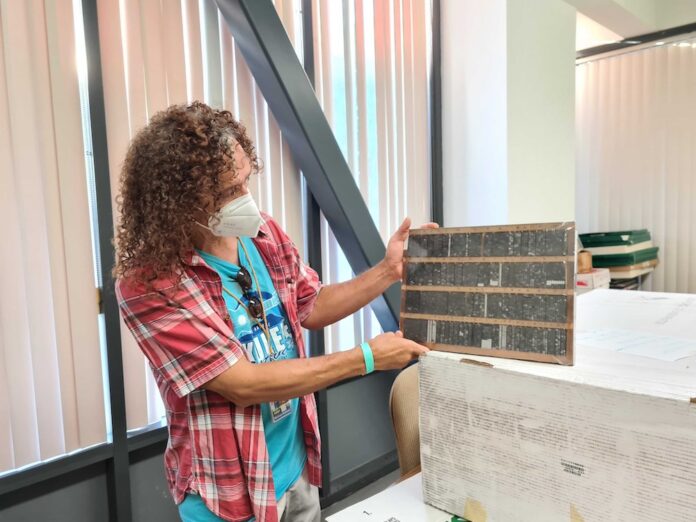
Besides widely circulated daily newspapers like the LA Times, LA is also home to numerous cultural newspapers that tailor their language and content to readers from specific racial and ethnic communities. As three of the many cultural news sources in LA, the Rafu Shimpo, La Opinión and the LA Sentinelbring their respective communities the news that matters to them.
Rafu Shimpo
Rafu Shimpo is the longest-running Japanese American daily newspaper in the U.S. and was founded in 1903 by three Japanese immigrant students from the University of Southern California. It has been published non-stop with the exception of during World War II due to the internment of Japanese Americans, according to Gwen Muranaka, senior editor of Rafu Shimpo. Muranaka said the paper is available in print and online formats, and is written in English as well as Japanese.
Rafu Shimpo’s Japanese language edition has a broader focus than its English version, according to Muranaka. The English section focuses more on local news from the Japanese American community in and around Little Tokyo, while the Japanese edition covers local, national and international news. Rafu Shimpo covers all major news categories, from community to lifestyle and entertainment, but the sports section has enjoyed a special standing in the English edition, according to Muranaka.
“We like to cover the accomplishments of Japanese American athletes that may not be covered in the daily, regular Metro papers,” Muranaka said.
According to Michael Hirano Culross, sports, arts and entertainment editor for the English section at Rafu Shimpo, the paper’s small size does not limit its commitment to journalistic integrity.
“We’re not the Washington Post or the New York Times, but we don’t want to be just a community newsletter either,” Culross said. “When something happens, we try to get it right — we talk to people, we cite sources, we try to follow up as best as we can and when it seems like we’ve got it right, we run [the story].”

La Opinión
Founded in 1926, La Opinión has become the most read Spanish-language newspaper in the U.S. over its 95-year history, with over 20 million print and online readers worldwide every month.
Ricardo López Juárez previously worked as a writer for La Opinion’s print edition and is now a managing editor of La Opinión online. According to Juárez, La Opinión’s print edition includes news that is relevant to the local Hispanic community.
“Everything related to immigration, local services, public health, government announcements, community programs – anything that can be useful for Hispanics in California,” Juárez said.
La Opinión’s editorial focus was narrower and more community-centered before waves of immigration brought in Hispanic people from diverse nationalities, according to Juárez. Now, the online edition includes most of the print newspaper’s stories, but also news from beyond LA and California, according to Juárez.
Jesús Martínez is an Eagle Rock native and the protagonist of a recent La Opinión story that profiled his transition from a flower vendor to a cryptocurrency specialist. Martínez said he has been reading La Opinión since 2011 because he believes in the mission of traditional newspapers.
“Editors and reporters actually take their time to sort out these stories,” Martínez said. “With everything online now, you don’t know what’s fake.”
LA Sentinel
Founded in 1933, the LA Sentinel is the paper of record for LA’s African American community, according to Danny Bakewell, Jr., executive editor of LA Sentinel. As one of the largest and most influential African American newspapers in the Western U.S., the LA Sentinel reports on major events and interviewing influential local leaders, according to Spectrum News.
Leon Washington, Jr. was the original founder of the LA Sentinel, and used the paper to advocate for economic opportunity and equity for the Black community, according to Black Past, an online reference center for African American history. He was jailed in 1949 for calling for non-violent demonstrations against white business owners who profited from the Black community without hiring Black workers. He continued to publish the paper until his death in 1974, after which his wife, Ruth Brumell, became the editor and publisher.
In 2004, fourteen years after Washington’s wife passed away, Bakewell Jr. acquired the LA Sentinel. He said he tried to expand coverage of the African American community in LA.
“When we first bought the paper, it was more doom and gloom, it was [reporting] on the worst things that were happening in our community – ‘there was a shooting in Crenshaw’ and so on,” Bakewell Jr. said. “[Now] we have our focus on uplifting stories – not that we don’t report violent crime – more positive profiles on Black businesses, how they are surviving through the pandemic. We do more stories on our elected officials and community leaders, and our unsung heroes who do great work in our community everyday. ”
In order to broaden its readership base, the LA Sentinel expanded its publishing platforms to include a website, mobile app, social media platforms and an “ePaper” format for those who want to read the print edition electronically, according to Bakewell Jr.
Even as the paper becomes more modernized, its mission, to be “the voice of our community speaking for itself,” remains the same.
![]()






























